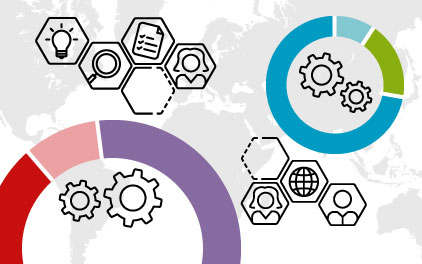
- SUSTAINABLE ECONOMIC DEVELOPMENT
- GOVERNANCE
- CLIMATE CHANGE AND ENERGY
- INTERNATIONAL SERVICES
Pakistan
GIZ local staff
National employees: 380
International employees: 45
Development workers: 2
(as at: 31.12.2024)
The Deutsche Gesellschaft für Internationale Zusammenarbeit (GIZ) GmbH has been working in Pakistan since 1961 and has offices in several provinces.
Pakistan is the fifth most populous country in the world and plays a significant geopolitical role given its central location in South Asia. At the same time, the country is facing a number of challenges. Pakistan is severely affected by climate change, with extreme weather events threatening the livelihoods of large parts of the population and taking a toll on social protection systems. On top of this, Pakistan is host to around 1.4 million registered refugees from Afghanistan. The refugees do not have sufficient access to training opportunities, which is also the case for women and young people. The sluggish economy is limiting their chances of earning a decent regular income.
GIZ operates in Pakistan on behalf of the German Federal Ministry for Economic Cooperation and Development (BMZ). As part of the EU’s Team Europe, GIZ contributes to achieving the United Nations Sustainable Development Goals. Its work focuses on the following areas:
- Climate change and just energy transition
- Social protection and local governance; support for Afghan refugees and host communities
- Sustainable economic development and vocational education and training
In the area of climate and energy, GIZ works with the Pakistani Government to address the impacts of climate change. To this end, GIZ facilitates climate financing designed to improve the response to climate risks. In addition, steps are being taken to implement the Paris Agreement and to pursue climate neutrality. GIZ is also committed to a just energy transition, providing advice and training to achieve an efficient energy supply, promoting climate-neutral construction and hosting knowledge exchange platforms such as the Pakistan-German Renewable Energy Forum.
In the field of social protection, GIZ supports reforms to combat poverty and inequality. Alongside facilitating access to education and health services, GIZ also works to give refugees and members of their host communities an opportunity to obtain vocational qualifications. These measures help to foster good relations between Afghan refugees and their Pakistani host communities.
GIZ promotes training, employment and sustainable economic growth in Pakistan. Together with the state-run vocational training institutes, GIZ improves the quality of training and tailors programmes to the needs of the labour market. In addition, women receive support to learn male-dominated professions, for instance in the automotive industry or in the skilled trades. In the textile industry, one of the country’s largest economic sectors, GIZ works to promote new environmental and social standards. These standards improve working conditions, foster greener production and boost companies’ international competitiveness.



